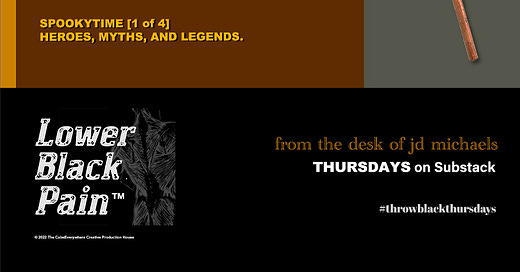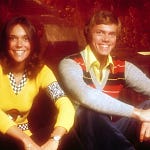Wizards, fairies, unicorns, and talking animals dominate children’s fantasy literature, but the Tall Tale, our All American domestic folklore of the Wild West, features strapping human beans like Johnny Appleseed, Pecos Bill, and Paul Bunyan.
Included in this line-up is John Henry, the steel-drivin’ African-American railroad worker. Revered for his strength and character, John pits his skill at hammering railroad spikes against a newfangled steam powered robot. His story is that of human against machine, Man versus the Industrial Age, and he wins, and then immediately dies, so…it’s a bit dark.
None of the other characters were as curiously doomed, and though I super appreciate his cultural addition to the collective character base I never really dressed up as him for Halloween. He’s a hero, no doubt. I’ve picked up a sledgehammer; there is no chance I could be able to work with that all day, much less trick or treat with it.
I mean, I was seven.
I did dress as Captain Marvel once (the golden age one, not either of the current movie ones); and one year I was a werewolf with a full head mask I had wanted for two years that I was given on my birthday to much lycanthropic glee. But never John Henry. However, there have been other Americans Named John that I’ve greatly admired, and in some cases, been able to emulate.
John Williams’ music filled the house for years; the album cover of the Star Wars original soundtrack was more dog-eared than any other in our collection. I’d watch the record spin and wonder how the impossible beauty of Princess Leia’s Theme came from those nearly invisible grooves. In an age beset by disco and synthetic sounds, a twelve year old spending hours in front of an orchestral 4-sider should have been unlikely.
Later, when I actually started composing, John Williams’ unpretentious honesty to create what might as well have been classical hip-hop (head bobbing grooves and riffs you couldn’t stop humming) fueled my confidence that I could arrange sounds and connect with people that way too.
I didn’t even know at the time that he’d written both the Land of the Giants and the Lost In Space themes (season three is just the best). And the NBC Nightly News theme? What?
Legend.
“The Hotel New Hampshire” was my favorite novel in high school. I would’ve bought the album and t-shirt if they had one. I read and re-read it, then went backwards through all of John Irving’s work to read everything he’d written before it. It was, all of it, incredibly inappropriate age-wise, and absolutely foreign to any experience in my bi-state area.
Most of his stories took place in a mythical place called “New England”; where buildings had “charm” and the air was “crisp” and leaves “crunched lightly” beneath your feet as you walked on the wide white sidewalks. Kansas City leaves made a kinda squncsh sound, and our air was just plain cold; his description of a “Typical American Life” was just the kind of science fiction I needed to encourage me to write stories about up crazy made-up places too.
And Jonathan Winters.
You may have an artist you love, possibly a musical artist, whose work touched your life deeply, melding with time and space to create memories so potent that, when you hear these songs again, your mind, no, your whole being floods with emotion.
That’s how I feel about sticks.
Give Jonathan Winters a stick, and he went bananas. It was a fishing pole, a rifle, an antenna (both insect and television), an oar, and a swashbuckling sword, all in the space of 60 seconds. His perspective on the world, and the comedy that generated from it, was my cement foundation, the point where I calibrated my logic barometer to sea level.
There was no imitating Jonathan Winters, he was a verb, something happening, not someone just being. And in my passion for his art of what, ok, was probably (quite clinically) lunacy, I luckily inherited his courage against embarrassment; I never worried about outside reaction but dedicated and committed myself to live life from the inside out. And he was the master of tall tale telling…positively heroic.
Halloween costumes are stories that we wear, and we want to represent the character’s bravery, but not necessarily duplicate their experiences. I mean, I would punch Thanos dead in the face if I was Captain America but I’m not just out looking for trouble. John Henry’s story, spanning from slavery to tragedy, was a deeply layered passion play that exceeded my load bearing weight as a grade school kid, yet for a while it was the only story of a black hero, and though I couldn’t imagine being him, I loved to hear his tall tale told.
I never dressed as Jonathan Winters for Halloween either; early 60’s comic, that would have been, what, a black suit with a tie? Gotta be careful with that; add a candy cigarette and suddenly I’m Lenny Bruce! That’ve been fun.
I don’t think he would have said “trick or treat” though, he might’ve…hmn…yeah….probably wouldn’t have gotten any candy that year.














Share this post